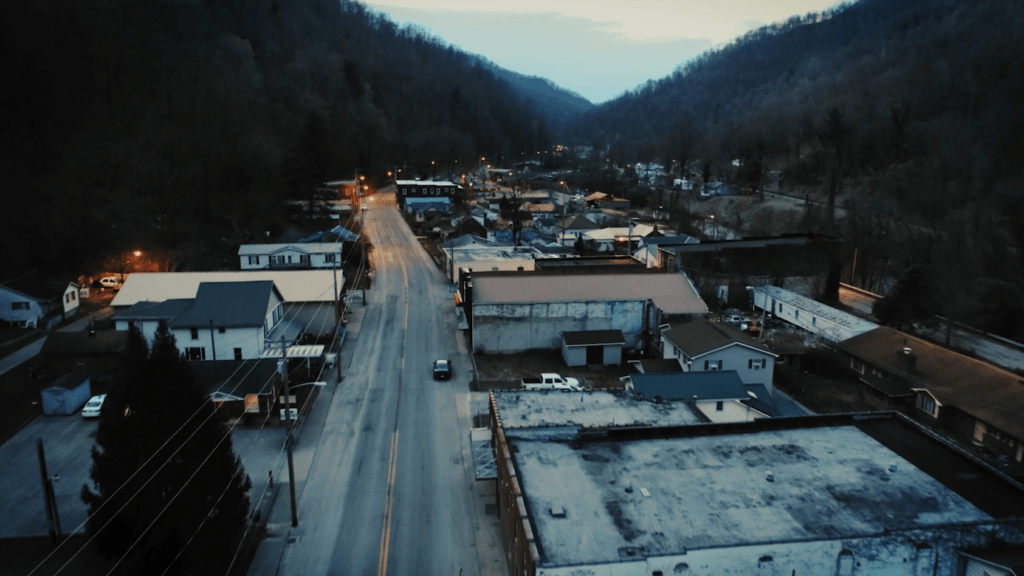Two documentaries about the coal industry’s ruthless exploitation of workers and natural resources in the Appalachian mountains are required viewing for anyone who cares about social and economic justice, and climate change. One is a poetic masterpiece. The other is an excellent, though no less powerful, talking heads explainer on the topic. Together they hope to school viewers on the importance of helping the people Hillary Clinton foolishly dismissed during her 2016 presidential campaign and why many of them continue to celebrate the “cursed resource” that once made them solid middle class workers who are now just scraping by.
Director Elaine McMillion Sheldon’s “King Coal” is a family production. Her husband Curren Sheldon served as cinematographer, and both of them worked together on the short doc, “Heroin(e),” which garnered them an Oscar nomination in the 2018 Academy Awards. That film was about the opioid epidemic, a subject not touched upon as much in “King Coal.” (It’s covered thoroughly in the other coal doc I review below.)
At the center of the film are two young girls, who almost serve as avatars, one white (Laney) and one black (Gaby) who work together on a school project about coal, who investigate the mines, attend the various coal celebrations, including a beauty pageant, a coal shoveling contest, a high school football game whose team are called “the Miners” and a New Year’s Eve marked by a lump of coal dropping! (They also go to a carnival put on by “Gambill Amusement Company”–probably relatives of mine!)
The film employs a unique blend of realism and poetry used to express the nostalgia of the coal workers for what was once a great way of life. There are scenes in which the two girls’ movements are choreographed by Celia Rowlson Hall. A breath artist (Dominic “Shodekeh” Talifero) supplys a compelling sound design. A tender narration speaks of “King Coal” as if he were a dead monarch who once blessed the land and it’s workers. One shot of Laney rolling in the forest with her beautiful red hair evokes the utopic feeling of a Pre-Raphaelite painting.
These workers were once treated like heroes who helped produce the steel to win a world war. But the King has died now that the unions are gone, men go to work for dramatically lower wages and no benefits, workers are dying of cancer before they reach age 60, and a beloved 500-year-old white oak tree has to be cut down because of pollution. Why do they still praise “Massey,” the coal extraction company with the horrible safety record? Why do they still worship the bituminous matter that is killing them and the land they live on?
They aren’t stupid or delusional. “I remember learning that if I said anything bad about the King, I was betraying my loved ones,” Laney says. Where are the green jobs the politicians promised them? Why do liberal democrats blame these hard workers for their own products, for their failure to adapt?
An aging miner’s instincts are compared to those of “spiders and birds” rather than humans. (Canaries, we are told, were used in coal mines as late as 1986.) Death was always one mistake away. This seems to have left them with a strong sense of fatalism, a feeling that no one owes them anything, that they have carved out their own destiny. You may remember the proud farmers in news reels from the 1930’s who would say, “I don’t want a hand out.” Corrupt politicians like Trump and West Virginia Senator Joe Manchin are skilled at exploiting this stoicism (mocked by liberals) for their own unforgivable plans. You can watch “King Coal” for free here.

Yes, Joe Manchin has some explaining to do to his constituents, to the members of the party he claims to once have represented and to all Americans and citizens of the world (if you get right down to it.) “The Devil Put the Coal in the Ground” is a more conventional documentary that uses a number of interviewees to represent the different roles those involved in the struggle for justice in West Virginia: the activist, the addict, the politician…
Robert Billot, the attorney whose lawsuits against DuPont were dramatized in Todd Haynes’ 2019 film “Dark Waters” speaks to the environmental damage big coal has done to the state, including the practice of “mountain top removal,” in which explosives are used to blow up as much as 400 feet to make it easier to extract the coal. It takes 100 years to create one inch of topsoil, another activist points out.
The owner of a pawn shop tears up as he speaks to the poverty and pain he has witnessed in his community over the years. A former opioid addict recounts the grip of over-prescribed OxyContin and other drugs to deal with the depression of hopeless citizens as he points to the buildings in his neighborhood that used to be “drug houses.”
And then there is Manchin, Senator for West Virginia since 2010, now an “Independent.” He owns a coal company and has consistently blocked government efforts to transition to cleaner energy sources in both his state and the entire country. While to some of his voters this may seem to translate into an attempt to protect the few low-paying coal jobs from going away, he is clearly just looking out for his own profits. How many progressive votes in the Senate have been blocked by this lying, treacherous enemy of his own people?
Directed by Peter Hutchison (who also made the great 2015 doc about Noam Chomsky, “Requiem for the American Dream”) and Lucas Sabean, this powerful, award-winning film begins streaming on iTunes and Amazon Prime on July 9.
Write or email to voice your outrage:
Senator Joe Manchin
306 Hart Senate Office Building
Washington D.C. 20510